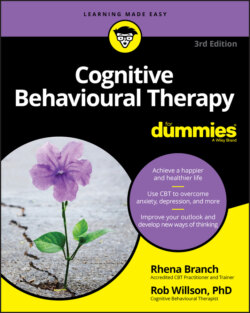Читать книгу Cognitive Behavioural Therapy For Dummies - Rob Willson - Страница 32
Making Demands: Thinking Flexibly
ОглавлениеAlbert Ellis, founder of rational emotive behaviour therapy, one of the first cognitive-behavioural therapies, places demands at the very heart of emotional problems. Thoughts and beliefs that contain words like ‘must’, ‘should’, ‘need’, ‘ought’, ‘got to’ and ‘have to’ are often problematic because they’re extreme and rigid (see Figure 2-8).
© John Wiley & Sons, Inc.
FIGURE 2-8: Demands.
The inflexibility of the demands you place on yourself, the world around you and other people often means you don’t adapt to reality as well as you could. Consider these possible examples:
You believe that you must have the approval of your friends and colleagues. This leads you to feel anxious in many social situations and drives you to try to win everyone’s approval – possibly at great personal cost.
You think that because you try very hard to be kind and considerate to others, they really ought to be just as kind and considerate in return. Because your demand is not realistic – sadly, other people are governed by their own priorities – you often feel hurt about your friends (or even strangers) not acting the way you do yourself.
You believe that you absolutely should never let people down. Therefore, you rarely put your own welfare first. At work, you do more than your fair share because you don’t assert yourself, and so you often end up feeling stressed and depressed.
Holding flexible preferences about yourself, other people and the world in general is the healthy alternative to inflexible rules and demands. Rather than making demands on yourself, the world and others, try the following techniques:
Pay attention to language. Replace words like ‘must’, ‘need’ and ‘should’ with ‘prefer’, ‘wish’ and ‘want’.
Limit approval seeking. Can you manage to have a satisfying life even if you don’t get the approval of everyone you seek it from? Specifically, you’ll feel more confident in social situations if you recognise your preference for approval rather than viewing approval as a dire need.
Understand that the world doesn’t play to your rules. In fact, other people tend to have their own rulebooks. So, no matter how much you value considerate behaviour, your friends may not give it the same value. If you can give others the right to not live up to your standards, you’ll feel less hurt when they fail to do so.
Retain your standards, ideals and preferences and ditch your rigid demands about how you, others and the world ‘have to’ be. So keep acting consistently with how you would like things to be rather than becoming depressed or irate about things not being the way you believe they must be.
When you hold rigid demands about the way things ‘have got to be’, you have no margin for deviation or error. You leave yourself vulnerable to experiencing exaggerated emotional disturbance when things in life just don’t go your way.
